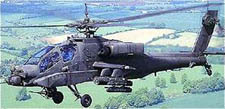 |
| Vol. 2 No. 2 | February 2000 |
US Senators: No Aid to Syria
19 January 2000
Ha'aretz reported today that members of the Senate Appropriations Committee visiting Jerusalem told Israeli officials that they have no intention of approving economic or military aid to Syria. Israeli officials have said that they support American aid to Syria once a final peace settlement is reached.
Syria is Producing Deadly Chemical
25 January 2000
According to today's edition of the Israeli daily Yediot Aharonot, Western intelligence officials recently disclosed that Syria is producing a deadly weapons-grade chemical called Ricin which is fatal when inhaled even at low levels of exposure. Ricin is extracted from the seeds of the castor oil plant (which grows abundantly in Syria) and relatively inexpensive to produce.
 |
| Access denied |
According to a report today in Ha'aretz, Israel's purchase of Apache "Longbow" helicopters from the US is being held up by the Pentagon's refusal to give Israel the codes for the accessing the software of the gunship's central onboard computer. IAF Chief Maj. Gen. Eitan Ben-Eliahu said that the access codes are "essential" for modifying the helicopter's defenses against new threats.
UAE: Kuwait Should Grant Iraq an Outlet to the Sea
8 February 2000
Citing Kuwaiti press reports, Al-Nahar reported today that United Arab Emirates Defense Minister Muhammad bin Rashid al-Makhtoum recently suggested that Kuwait grant Iraq an outlet to the Persian Gulf in order to "preserve stability" in the region.
Iraqi Official Denies Contacts with Israel
8 February 2000
Al-Sharq al-Awsat quoted an Iraqi official as denying reports that Baghdad and Tel Aviv have been conducting secret negotiations. The official, a member of the delegation accompanying Iraqi Foreign Minister Muhammad Sa'id al-Sahhaf during his brief visit to Amman, said that Iraqi citizens are not allowed to travel to Israel, or even to areas of the West Bank under the control of the Palestinian Authority if this involves passing through areas under Israeli control.
Iraqis Uncover Mass Grave of Dissidents from 1991 Uprising
8 February 2000
The Supreme Council for Islamic Revolution in Iraq (SCIRI) reported in its weekly newsletter that Iraqi citizens discovered a mass-grave near Baghdad on January 11 containing the remains of over 30 Iraqis killed during the 1991 uprising against the Iraqi government which immediately followed the Gulf War. Iraqi security forces reportedly arrested those who discovered the grave and relocated the remains.
Syrian Muslim Brotherhood Closes Office in Amman
9 February 2000
The Jordanian daily Al-Arab al-Yawm reported today that the Syrian Muslim Brotherhood has closed its office in Amman as a result of the recent improvement in Jordanian-Syrian relations. The movement's spiritual leader, Ali Sadr al-Din Bayanuni, said that the Muslim Brotherhood "opted to close the information bureau in Jordan" on its own accord "in light of the improved ties between the two countries." The Syrian group had previously moved the venue of its Shura Council meeting from Amman to Baghdad six months ago.
� 2000 Middle East Intelligence Bulletin. All rights reserved.